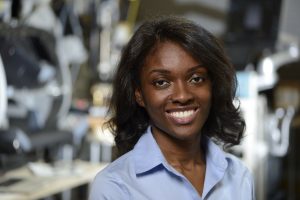
Dr. Muyinatu Bell is an Assistant Professor of Electrical and Computer Engineering with a joint appointment in the Biomedical Engineering Department. She directs the Photoacoustic and Ultrasonic Systems Engineering (PULSE) Lab at JHU.
What initially got you interested in science?
I wanted to be a scientist since I was 6 years old. I was always fascinated and curious to learn new things about the world around me. For example, I was interested in electricity and magnetism, but this was not a topic that was covered in any of my science classes. So, I took a trip to the public library, checked out books to take home with me, and followed their instructions to make my first solenoid, which I later presented as my 7th-grade science fair project. In general, I loved trying new projects for my school’s annual science fair, and science and math were always two of my favorite subjects.
What made you decide to focus on engineering?
I was selected to participate in a program for female high school sophomores who excelled in math and science. This program was designed to introduce us to engineering. I never really knew what an engineer was until I participated. Through my participation, I learned that engineering was the perfect description of all of the interests I had up until that point in my life — math, science, and a passion for creating and building new things.
What groups/extracurricular activities did you participate in while studying in college?
I was quite active in several groups as an undergrad at MIT — I was one of the founding members of the Women’s Technology Program in Mechanical Engineering, I was the treasurer of the MIT Black Student’s Union, and I was an editor for the MIT BMES Chapter newsletter, just to name a few. I was also a member of the MIT NSBE chapter and the Black Women’s Alliance at MIT.
What are your biggest research accomplishments?
I am really excited about all of the work that I do, and I find it difficult to choose one accomplishment over another. Sometimes my accomplishments receive external recognition, like the MIT TR35 Award and most recently the NSF CAREER Award, which recognized two of my research contributions. The first contribution is my improvement of ultrasound image quality using a new approach to beamforming that directly displays spatial coherence rather than the traditional amplitude-based display methods that have been used in the 50+ year history of ultrasound imaging. The second contribution is my development of novel technology to advance the very new field of photoacoustic-guided surgery. This field uses light and sound to make images of underlying anatomy, with the goal of helping surgeons to avoid accidental injury to vital structures (like major blood vessels) that are hidden by tissue and often reside in a surgical tool’s path. These two significant recognitions would initially lead me to say that they are two of my biggest research accomplishments to date. However, the reality is that I have other research accomplishments that have not received recognition (at least not yet), but I believe that they are no less significant than the ones that have.
What are you looking forward to focusing on in the future?
The PULSE Lab is currently focusing on various aspects of ultrasound imaging, photoacoustic-guided surgery, and robot-assisted imaging. In addition, we are pioneering the application of deep learning to improve photoacoustic image quality and translating similar principles to improve ultrasound images. I am looking forward to continuing on this path and ultimately realizing new clinical systems that will change the diagnostic and surgical landscape as we know it today.
What advice would you give students who are interested in engineering?
I have three pearls of wisdom that have worked well for me during my years as a student. First, focus on learning as much as you can rather than trying to do the bare minimum needed to get a passing grade. Second, don’t be afraid to ask for help. We’ve all needed help at some point in our lives, and it should be no different for students who are faced with a demanding engineering curriculum. Third, follow your passion and don’t be discouraged if your passion does not fit into a well-defined box. Either you will end up defining a new “box” that simply does not exist yet…. or your box already exists and you are just not aware of it yet. The latter was my situation when I learned about engineering in high school. The former is my current situation, given my multidisciplinary interests, skills, and background.